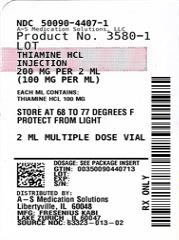Thiamine | A-s Medication Solutions while Breastfeeding

What is Thiamine | A-s Medication Solutions used for?
Thiamine | A-s Medication Solutions while breastfeeding safe or not? Can there be any side effects for infant while using it during breastfeeding?

Thiamine | A-s Medication Solutions Breastfeeding Analsys
Thiamine hydrochloride while Breastfeeding
SafeCAS Number: 67-03-8
Thiamine or Vitamin B1 is a water soluble vitamin. In addition to Thiamine, other chemical compounds with similar activity: Acetiamine, Benfotiamine, Bisbentiamine, Bisbutiamina, Cetotiamina, Cicotiamina, Cocarboxylase, Fursultiamine, Monofosfotiamina, Octotiamine, Pyrophosphotiamine, Prosultiamine and Sulbutiamine.It is essential for the metabolism of carbohydrate nutrients. Its deficiency causes severe neuromuscular and cardiac symptoms known as Beriberi and Wernicke-Korsakoff disease. Thiamine deficiency is common among disadvantaged populations in Southeast Asia (predominantly consumers of refined rice), other malnourished people (refugees, low socioeconomic status ...) and chronic alcohol consumption. Beriberi of childhood, both infants and children, may arise from breastfeeding by Thiamine deficient mothers. Reportedly, several severe cases have occured after feeding the babies with artificial formulas that were not supplemented with vitamin B1. Daily allowance is higher during pregnancy and lactation (1.5 mg / day) which is readily obtained through a varied diet with adequate content of whole grains, legumes, nuts, eggs and lean meat.Thiamine is excreted in breast milk and gradually increases with time, being lower in colostrum (28 ng / mL) and transitional milk than in mature milk (180 ng / mL). The concentration is lower in milk from mothers of preterm (90 ng / mL). Taking vitamin supplementation is not required if diet and nutritional status are adequate. Supplementation does not increase levels in milk of well-nourished women, but of those with a low nutritional status. The supplementation of group B vitamins and C and E vitamins to HIV positive mothers improves the weight growth of their breasted babies.There is no evidence of their effectiveness in improving athletic performance, lack of appetite, sores, stress, fatigue or aging.Toxicity linked to excessive consumption of thiamine is not known. WHO List of Essential Medicines 2002: compatible with breastfeeding.American Academy of Pediatrics: usually compatible with breastfeeding
What if I already have used Thiamine | A-s Medication Solutions?
As usage of Thiamine | A-s Medication Solutions is mostly safe while breastfeeding hence there should not be any concern. In case of any change in behavior or health of your baby you should inform your health care provider about usage of Thiamine | A-s Medication Solutions else no further action is required.
I am nursing mother and my doctor has suggested me to use Thiamine | A-s Medication Solutions, is it safe?
Definitely, Thiamine | A-s Medication Solutions is safe in lactation for baby. No wonder your doctor has recommended it.
If I am using Thiamine | A-s Medication Solutions, will my baby need extra monitoring?
No extra baby monitoring required while mother is using Thiamine | A-s Medication Solutions
Who can I talk to if I have questions about usage of Thiamine | A-s Medication Solutions in breastfeeding?
US
National Womens Health and Breastfeeding Helpline: 800-994-9662 (TDD 888-220-5446) 9 a.m. and 6 p.m. ET, Monday through Friday
UK
National Breastfeeding Helpline: 0300-100-0212 9.30am to 9.30pm, daily
Association of Breastfeeding Mothers: 0300-330-5453
La Leche League: 0345-120-2918
The Breastfeeding Network supporter line in Bengali and Sylheti: 0300-456-2421
National Childbirth Trust (NCT): 0300-330-0700
Australia
National Breastfeeding Helpline: 1800-686-268 24 hours a day, 7 days a week
Canada
Telehealth Ontario for breastfeeding: 1-866-797-0000 24 hours a day, 7 days a week
